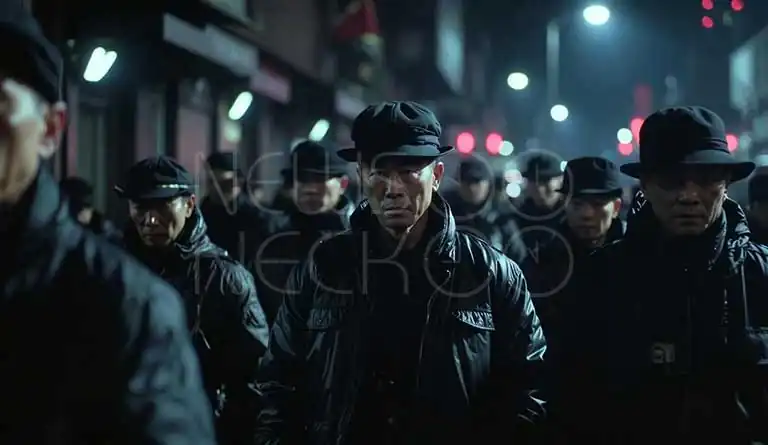The Chicken and the Monkey: Inside China’s Brutal Crackdown on Borderland Scam Kings
The man on the screen sits in a sterile, padded room. His wrists are bound in handcuffs. An investigator’s voice, calm but firm, cuts through the silence.
“Should I feel anything?” the man asks, his eyes empty of any emotion. He is being questioned about ordering a murder, a human sacrifice to celebrate a business deal.
“Wasn’t he a living, breathing person?” the investigator counters.
“I didn’t feel much,” the man replies.
This is not a scene from a new crime thriller. This is real life, broadcast on Chinese state television. The man is Chen Dawei, a member of one of the most powerful criminal families to ever operate along the China-Myanmar border. His confession is a key piece in a stunning public relations campaign by Beijing, one that reveals a dark world of forced labor, online scams, and brutal warlords—and China’s ruthless mission to destroy it.
For years, thousands of Chinese citizens were lured by promises of high-paying jobs in Southeast Asia, only to find themselves trapped in nightmare. They were forced to become online scammers, defrauding strangers back home for hours on end, facing torture, or even death, if they refused. The masterminds behind this billion-dollar industry were four families with near-mythical power in the Burmese border town of Laukkaing.
Now, Beijing is making them pay. And they are making sure everyone watches.
From Warlords to ‘Godfathers’
The story of how Laukkaing became a hub for criminal empires reads like a political drama. In the early 2000s, the town was a poor backwater. Then, Myanmar’s military leader, Min Aung Hlaing, led an operation to remove the local warlord. He needed new, cooperative allies to control the area.
He found one in Bai Suocheng, the warlord’s former deputy. Bai was appointed chairman of Laukkaing, and his family soon commanded a private militia of 2,000 soldiers. In the power vacuum, other families—the Weis, the Lius, and the Mings—swooped in, securing military posts and political influence.
The Wei family placed a member in parliament and controlled a military camp. The Liu family took over essential services like water and electricity. Together, they transformed Laukkaing. Glitzy casinos and red-light districts sprang up, drawing money and vice. But their most profitable venture was yet to come: the rise of the “scam farms.”
Read More Articles: U.S Faces Growing Cyber Threat as Trump Cuts Gut Security Agencies, Experts Alert
Prisons Disguised as Offices
These scam farms were not offices but prisons. Young people, mostly Chinese, who had been tricked by fake job offers, were held against their will. Their passports were taken. They were forced to work long hours, creating fake online profiles to lure people into investment scams and other frauds.
Their targets were often their own countrymen back in China. Those who failed to meet quotas or who tried to escape faced brutal punishment. The stories that have trickled out tell of electric shocks, water torture, and in some cases, execution.
For years, these families operated with impunity, protected by their private armies and their political connections. They built immense fortunes on the backs of this human misery. But their reign was about to come to a dramatic end.
Also Read: Nvidia Boss Says China Will Win AI Race, Then Quickly Changes His Tune in Damage Control Scramble
The Fall of the Kings
In 2023, the tide turned. In a major coordinated move, Myanmar authorities moved in, arresting the powerful clan leaders and handing them over to China. The message from Beijing was clear and brutal.
Since then, Chinese courts have moved quickly. Eleven members of the Ming clan and five from the Bai family have been sentenced to death. Dozens of others have received long prison terms. The trials of the Liu and Wei families are now underway.
The state television documentaries are a central part of this punishment. They show the once-powerful clan leaders, now in identical prison uniforms, their hands cuffed, confessing to their crimes. The imagery is powerful and intentional. It is a classic Chinese strategy, what they call “killing the chicken to scare the monkey”-making a vivid example of a few to warn many.
An investigator in the documentary stated the goal clearly: “It’s to serve as a warning to everyone- no matter who you are or where you are- if you commit such terrible crimes, you will be held accountable.” against Chinese people, you will pay the price.”
For the thousands who were lured into this nightmare, the crackdown offers a form of justice. For Beijing, it is a show of strength and a warning to anyone who would prey on its citizens abroad. The scam kings of Laukkaing learned a hard lesson: no empire, no matter how powerful, is beyond the reach of a determined China.
Author: Yasir Khan
Date: 09 Nov, 2025
For More Updates, Visit Newsneck













